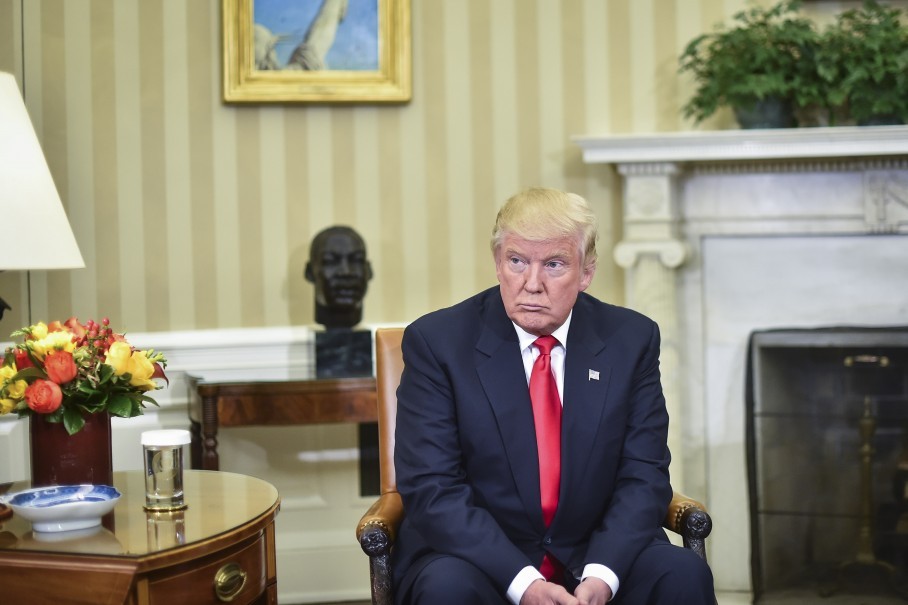
President-Elect Donald J. Trump will be sworn in as the nation’s 45th President on January 20th with the lowest approval rating and the least expectations than any president elect since the 1830s. (Photo Courtesy of the White House)
By Danny R. Johnson
San Diego County News’ Washington, DC Correspondent
WASHINGTON, DC – When General Andrew ‘Old Hickory’ Jackson was swept into the White House in the presidential election of 1828, the electorates wanted change they could believe in. The growing young country seethed with disgruntlement and rebellion. Farmers and drovers in the West and South resented the rich Easterners who ran the country for their own benefit. After the General Jackson’s Inauguration, his supporters returned to the White House and proceeded to get drunk. In an orgy of populist celebration, they smashed the china and crystal. Men in muddy boots stood on damask-covered chairs. The overdressed swells at the party were so alarmed by the rabble that they fled through the windows of the People’s House, along with the new President himself.
In the minds of millions of Republican and Democrat voters, the 2016 election was a simmering American electorate, angry at a Washington establishment more concerned with serving the vested interests that pay for its campaigns than with the declining living standards and perceived moral decay of the rest of America, stormed into polling booths across the country and chucked much of the nation’s Democrats governing class out the window. “We always vote for change, and we never get it,” said Steve Hodgins, 39, of Richmond, a house painter and Democrat who voted Republican this time.
Hillary Clinton may have won more popular votes than her rival and eventual winner, Donald J. Trump, but she lost the Electoral votes. Gone was President Barack Obama’s dream of another eight years of Democrats controlling the White House. Gone was the efforts of the Democrats to control the House and the Senate. Gone, perhaps finally this time, was the once solid Democratic domination of the Southern states.
And if not gone, certainly drastically diminished was the prospect of Clinton’s gaining ascension to a first term as the first woman President. The 2016 Presidential election could be called a tsunami national sea of change in which nobody really saw coming. The country had moved to the ideological alt-right. But the Democratic Party sounded more like a drowning breed. Voters were saying they felt misled. “I voted for Obama in 2008 and 2012, but he’s just got it all wrong about where we all stand on gays and guns and taxes. He sold us a bill of goods is what he did,” said Jerry Malbus, 42, a machinist in Bowie, Maryland, and a new convert to the G.O.P.
Replacing the Democratic liberals was a herd of Republicans ranging from the born-again to the libertarian, led by the china-and-crystal-smashing, and bombastic billionaire from New York, Donald J. Trump, the 45th President of the United States. After a short burst of conciliation on election night, he soon thereafter seemed disinclined to throw Clinton or the Democrats a rope. Weeks since his victory, President elect Trump has managed to create more drama and uncertainty in the minds of the American people and world leaders than anyone in the nation’s history.
A large cohort of Americans have reservations about the presidency of Donald Trump, who lost the popular vote by 2.9 million, strikes many who did vote for him as a highly flawed “lesser of two evils,” and has a dismal 37 percent approval rating.
That voters were angry was not the surprise. But the Democrats thought they were the solution, not the problem and pushed through the Affordable Care Act without a single Republican vote. Voters were plenty angry in the mid-term election of 2012, when President Obama felt the pain after for failing to pay attention to the concerns of average Americans. They became entranced with the big-picture economic statistics that showed a growing economy, rising employment, low inflation and a shrinking deficit. What they missed was the undiminished economic anxiety of the large working class and their concerns about big government programs. In 2016, overall the economy seemed to be doing fine, but most voters still felt the recession was unbroken in their area. A large number, 58% in a December 2016 recent CNN poll, said they did not feel better off as a result of the brighter economic picture. America may be No. 1 again in certain sectors of the economy and productivity, but the middle-class workers who made it so have seen many of their colleagues laid off, have been forced in some cases to settle for temporary jobs and in general have suffered an actual decline in disposable income.
At the same time, the upper class has actually increased its share of the nation’s abundance. The top 20% of the country’s income earners control half the country’s wealth, and only that group’s real income has been increasing over the past two decades. U.S. Senator Bernie Sanders (D-VT) was able to capture a number of these disenchanted working class Americans during his run for the White House. These numbers fuel a growing us-vs.-them psychology in the electorate and a decidedly jaundiced view of the political establishment: “they” are the people who vote themselves pay raises, take junkets, do favors for the financial establishment and provide themselves with generous health-care packages.
Clinton did not fully understand these facts as she campaigned for the presidency in 2016. She only preached against the unfairness of the disparity in incomes and wages after heavy bombardment from Sanders. On the other hand – Trump was able to exploit the blue collar and middle class working Americans with his mantra that people who “work hard and play by the rules” were getting worked over by pols who played around with the rules.
But once in office come January 20, Trump will be tested to see if he is so much a friend of the working class or as a captive of the economic and cultural elites. Most disastrously for the Democrats, they failed to understand that the most powerful expression of middle-class economic anxiety is an insistence that the government lighten the burden of taxation by shrinking itself and its role in the nation’s life. “I was angry that every problem identified by Washington was considered a crisis and that the only answer they could come up with was to throw more money at it,” said Bill Kribinshy, 39, an Atlanta medical-supplies salesman and Democrat who voted for Trump.
Most disastrously for President Obama and the Democrats, was their top-down, bureaucratic health-care initiative, ObamaCare, and the perceived reality among many of the electorates that immigration and Islamic terrorism were not being addressed. Staggering wages and economic uncertainty while rightly aimed at one of the prime causes of middle-class anxiety, was easily made to look like the epitome of taxand-spend liberal programs favoring “illegal immigrants”. The voters warmed up to Trump as their champion other than Clinton and the Democrats who appeared to have lost their appeal.
The Republicans have cast themselves again as enemies of Big Government, and thus as friends of the people. Tim Hargrove, a machinist in Jackson, Mississippi, believes it. “I’m sliding to the Republican side because they are more for the little guy.” But the new G.O.P. majority on Capitol Hill is no less beholden to the special interests for campaign funds than are the Democrats. It has been no more willing to unravel the elaborate system of entitlements like farm subsidies and Social Security and a variety of tax preferences that favor the rich and the established and make real tax relief for the working class unaffordable. Some of the G.O.P. have as great a penchant for trade deals, social engineering, in the form of making moral rules for the country to follow, as the Democrats do for contriving Great Society programs. And despite their fondness for building jails and imposing tough rules for sentencing criminals, they may be no more adept at providing one of the basic voter demands: safe streets.
The G.O.P. is still divided. While making war on Clinton, they will make war on themselves. By and large the new congressional Republicans, led by Trump, are of the busybody moralistic sort. But in the statehouses, Republicans governors in Ohio, Massachusetts, and Wisconsin are of the libertarian, problem-solving sort. The Democrats, in a division embodied in Clinton herself, are split between oldline, Big Government sorts and a faction that sees the limits of state intervention. A stable middle has yet to be established. Neither party has the leaders or the programs to transcend the need to satisfy the fire breathers on the edges. The electorate, meanwhile, veers back and forth trying to reach an equilibrium. Democrats are down, then up. Republicans out, then in. The search is on in earnest for a party and a program and a leader that are not captive to Washington and its aura of self-preservation and selfaggrandizement. It was certainly premature to declare a permanent Republican hegemony. One senior White House official had it right: “What the people have said is, `We’re going to make you folks coCEOs. We know you don’t like each other. But if you don’t get together and do the job, we may just fire both of you.”
It will not be easy for any Washington politician, including the newly incumbent, to break free of the capital’s grip. Even Andrew Jackson couldn’t resist the privileges of power. After his people had trashed the White House, he retained three servants who had worked for his elitist predecessor–a French chef, a steward and a butler–and began serving the finest clarets at dinner. He also hired a painter, who promptly began immortalizing his subject in heroic oil portraits. The rest is history.




